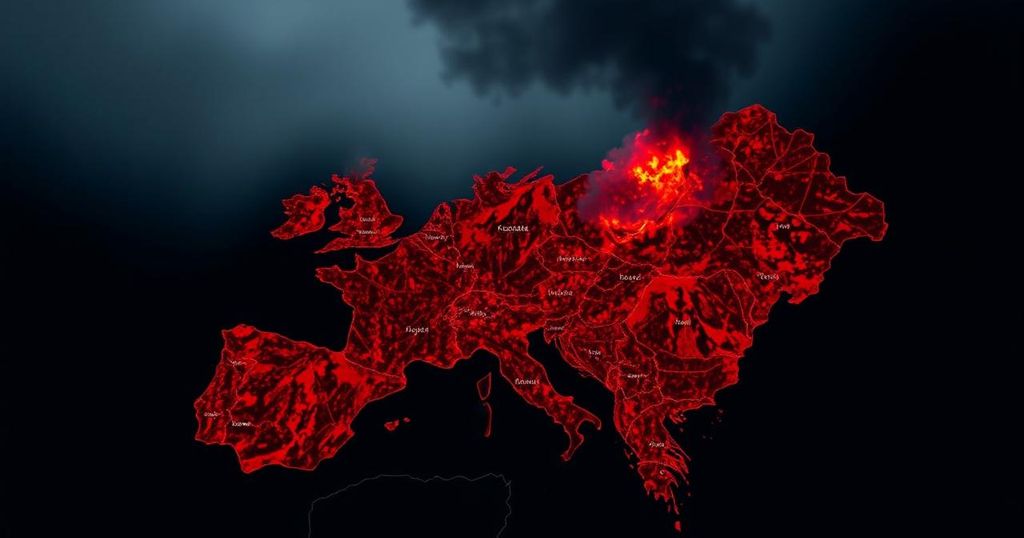Georgia’s Election: A Critical Choice Amidst Russian Fears

Georgia is on the brink of a critical election on October 26, with the ruling Georgian Dream party facing accusations of democratic backsliding and closer ties to Russia against the backdrop of the Ukraine conflict. Voter apprehension regarding war with Russia has influenced the campaign, characterized by stark imagery contrasting destruction and prosperity. The election represents a fundamental choice for Georgians regarding alignment with the West or submission to Russian influence. Opposition parties are struggling to unify, while concerns linger about the ruling party’s commitment to democratic principles in the event of a loss.
The Republic of Georgia is approaching a pivotal election on October 26, which is perceived as a significant decision point for the nation, determining whether its future aligns more closely with Western nations or with Russia. The ruling party, Georgian Dream, has faced accusations from both the United States and the European Union of regressing in its democratic practices and gravitating towards Moscow, allegations which party officials contest. Though polls indicate that Georgian Dream may encounter difficulties in securing a parliamentary majority, it remains uncertain whether opposition parties possess the capability to unite sufficiently to displace the current administration. Amidst the backdrop of Russia’s invasion of Ukraine, Georgian Dream has strategically embraced and heightened voter apprehensions regarding potential conflict with Russia, whose military continues to occupy 20% of Georgian territory due to an invasion in 2008. The party’s campaign prominently features stark visual contrasts on its election posters: one side depicts the devastation wrought by the conflict in Ukraine, while the opposite side illustrates a prosperous Georgia, underscored by the slogans “No to war! Choose peace.” Georgian Dream labels its opposition as a component of what they term the “global war party.” Political analyst Ghia Nodia of Ilia State University articulates that Georgian Dream has positioned itself as a “party of peace” in contrast to a perceived warmongering opposition. This narrative has found some resonance with voters, largely rooted in the haunting memories of past conflict, although it appears that the effectiveness of this message may be waning. Opposition leaders have expressed discontent with the campaign strategy, which they describe as exploitative. Their advertisements, which include visuals of Russian military atrocities, have been denounced as distasteful and inciting division. Despite this, Georgian Dream maintains its position, arguing its critiques are directed towards individuals who might advocate for involvement in ongoing wars rather than generalizing the West as a whole as part of the “global war party.” The upcoming election is regarded as a pivotal choice regarding Georgia’s national orientation: whether to align more with Western democratic ideals or to gravitate towards Russian authoritarianism. Analysts, including Ghia Nodia, have emphasized the significance of this election, remarking on the implications for Georgia’s future governance and international relations. The ruling party strongly refutes claims of increasing ties with Moscow, citing numerous United Nations resolutions and legal actions taken against Russia regarding its aggression in Ukraine as evidence of its commitment to a pro-Western stance. Georgia’s aspiration to join the European Union remains embedded in its constitutional framework, with polling indicating that over 80% of citizens support EU membership. However, relations between Georgia and the EU have become strained following the reintroduction of a controversial foreign agent law, akin to Russian laws which suppress political dissent. The situation has led to sanctions imposed by the U.S. and EU against Georgian officials. Zourabichvili, the nation’s president, along with many citizens, views the election as a referendum on Georgia’s geopolitical alignment. For the first time, legislative elections will employ a fully proportional representation system. Opposition parties have united into several coalitions to surpass the necessary threshold for election, although general public skepticism towards the political elite remains palpable. Giga Bokeria, a prominent opposition figure, asserts there is viable momentum among the populace for a shift in governance despite pervasive mistrust toward the political establishment. Concerns persist regarding Georgian Dream’s potential responses should electoral results not favor them; many citizens fear possible non-recognition of a defeat. Nevertheless, Samkharadze from Georgian Dream has conveyed confidence in the party’s adherence to democratic principles, asserting, “We will accept the people’s decision, whatever it may be.”
The context surrounding the upcoming election in Georgia is notably charged, influenced by its historical ties to Russia as a former Soviet republic and the current geopolitical climate characterized by Russia’s military actions in Ukraine. Internal politics are shaped by perceptions of democracy versus authoritarianism, with significant implications for Georgia’s relationship with Western allies. The ruling Georgian Dream party faces scrutiny for its alleged democratic backsliding and links to Russian interests, instigating heightened tensions among opposition parties and the electorate.
In summary, Georgia’s election on October 26 presents a critical juncture for the nation, reflecting deeper issues of national identity, foreign allegiance, and democratic governance. With the ruling Georgian Dream party under scrutiny and the looming specter of Russian aggression creating a charged atmosphere, voters face a consequential decision that could significantly alter Georgia’s political landscape and its orientation on the global stage.
Original Source: www.voanews.com








